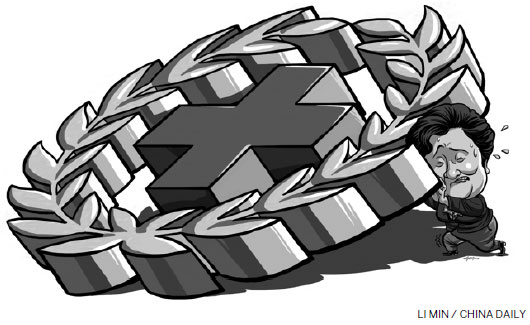Many people are wondering what direction the Red Cross Society of China will take in the post-Zhao Baige era. Will the ongoing internal reforms continue and will it take measures to handle humanitarian tasks more efficiently to regain people's trust? The answer: it has no choice but to do so.
Zhao resigned as the society's presiding executive on Sept 2. She had taken over the reins at the RCSC three years ago in the wake of the biggest public relations crisis faced by the State-run semi-official charity.
In 2011, Guo Meimei, a young woman claiming to head an organization under the RCSC, posted photographs of her luxury collections on the Internet. The arrogant flaunting of wealth by Guo triggered a public outcry, with people asking whether donations to the RCSC were being misused.
Although an official investigation that year ruled out any link between Guo and the RCSC, the damage had been done, as donations to the charity fell drastically. Guo was arrested recently for being involved in a sex and gambling racket. But the cloud of doubt and distrust over the RCSC is still to clear. In fact, the official micro blog account of the society is full of unsavory public comments.
It's a pity that the Chinese chapter of one of the oldest and largest humanitarian organizations in the world is facing such a predicament. Elhadj As Sy, secretary-general of the International Federation of Red Cross and Red Crescent Societies, has said that what the Red Cross delivers is the only tool for the organization's self-promotion and resource mobilization.
The media savvy and US-trained Zhao was aware of that when she launched the first intensive public relations exercise for and internal reforms in the RCSC. Some people said the PR exercise might have been prompted by the Guo incident. "I would ... resign if I can't change the 'black cross' (to red once again) in people's mind," Zhao told the media in 2011.
Zhao never hid her ambition and led from the front. As former vice-minister of the National Population and Family Planning Commission, she used to defend China's family planning policy at international conferences, arguing that a falling birth rate is a huge contribution to the world in terms of environmental protection and resource conservation.
Changes, however, didn't come easily to the RCSC, especially because of the increase in the number of civil charities and volunteers in the country owing to easing of regulations. People can now choose which charity to donate to, and only the professional, transparent and trustworthy organizations stand to get public support.
The RCSC has established an integrated humanitarian aid and rescue system for disaster relief and a donation tracking system to rebuild credibility. But as Sy said, the Red Cross needs to show solutions to get resources.
So, the Red Cross Society of China has to show solutions. Just by virtue of being a government-run charity organization, it will not get public support and resources easily. Then the people should not reject it just because it is a government-run organization.
The author is a journalist with China Daily. [email protected]

(China Daily 09/13/2014 page5)